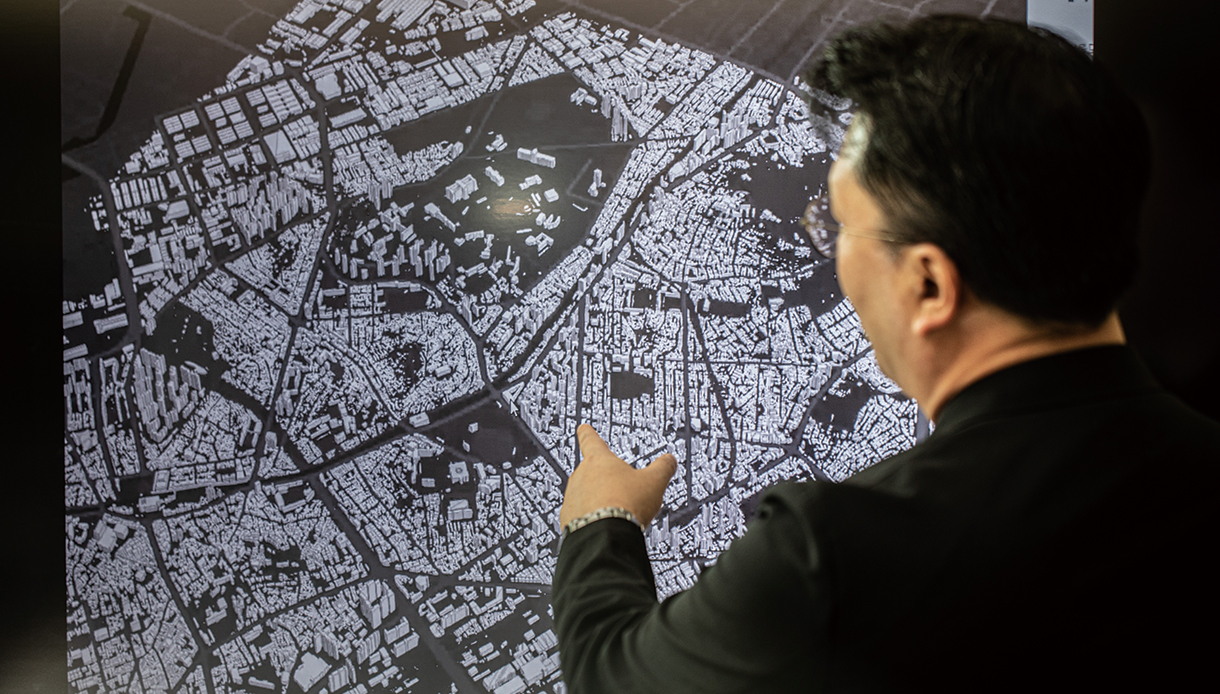

Story
진정한 스마트도시 구현을 위한
성공 전략은?
A Successful Strategy for a Truly Smart City
ERICA캠퍼스 건축학부 김환용 교수
Prof. Hwanyong Kim, Division of Architecture at ERICA Campus
- 글 김현지
- 사진 손초원
- Writing Kim Hyun-ji
- Photograph Son Cho-won
Scroll Down
In the era of the 4th Industrial Revolution, humanity has become smarter than ever. People who freely utilize cutting-edge digital technology, AI, and big data, now want to make the cities even smarter. They are so called “smart cities.” Many countries around the world, including Korea, are paying attention to implementing smart cities. So, are smart cities really the future that we are waiting for?
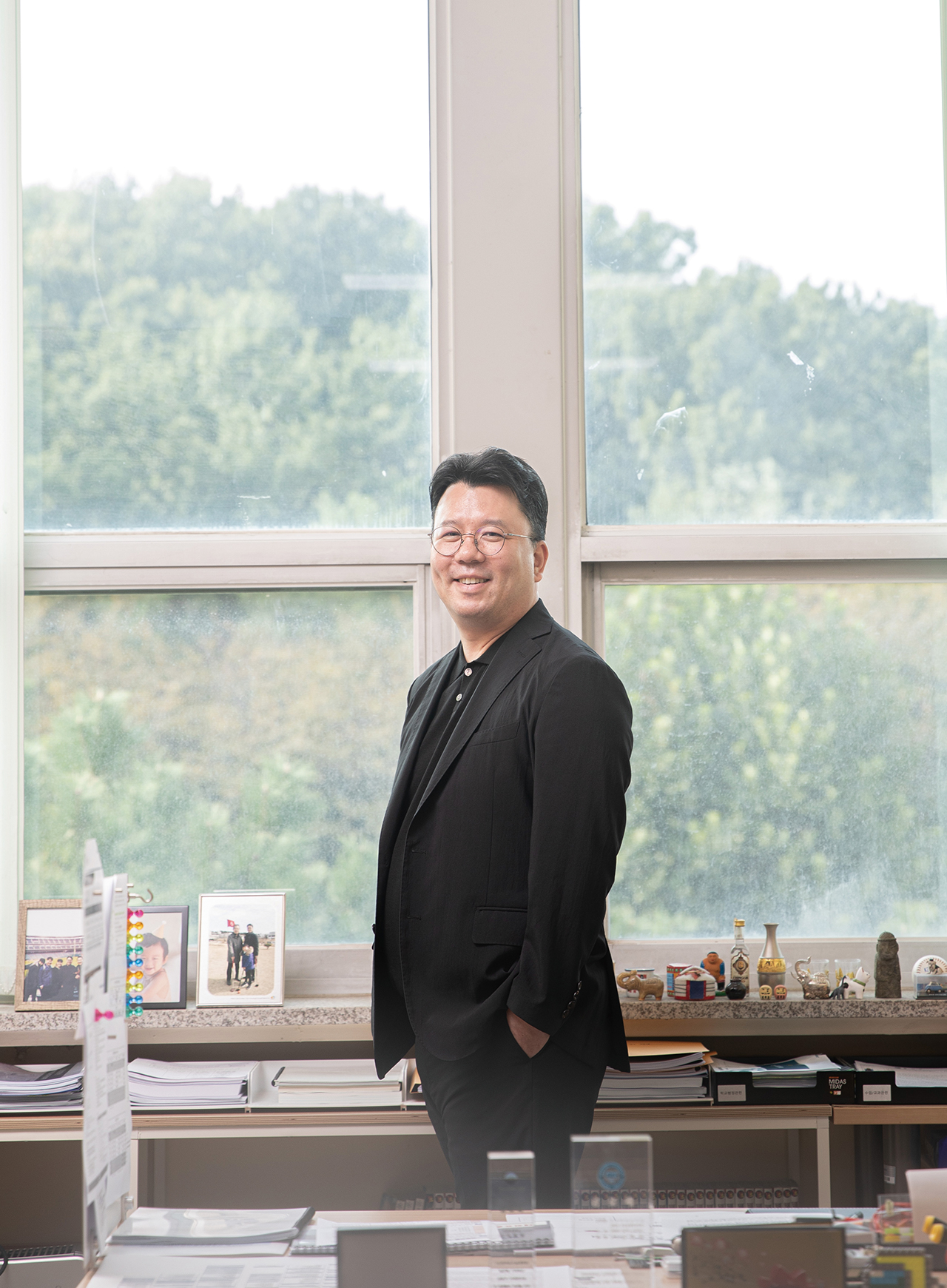
우리가 주목할 것은 ‘스마트’가 아닌 ‘도시’
“스마트도시의 기본 개념은 도시의 교통, 환경, 안전, 주거, 복지 서비스 등에 첨단 IT 기술을 적용하는 것입니다. 스마트도시는 단순히 몇몇 기술적 분야의 점유물이 아닙니다. 도시를 인간의 삶을 담는 그릇이란 관점에서 볼 때 스마트도시도 사회와 문화, 경제, 환경, 기술 등 모든 분야가 총망라되는 하나의 플랫폼으로 봐야 합니다.”
최근 언론이나 여러 미디어를 통해 스마트도시가 새로운 미래 도시를 상징하는 것처럼 표현되고 있다. 하지만 김환용 교수는 “스마트도시를 기존에 없던 완전히 새로운 개념이나 만병통치약처럼 바라보는 시각은 지양해야 한다”고 단언했다. 지리정보시스템과 공간데이터, 위성사진 등의 다양한 시공간적 자료를 활용해 도시계획의 효율성과 실효성 검증 연구를 펼쳐온 김환용 교수. 그는 데이터 활용의 연장선상으로 자연스럽게 스마트도시와 스마트건설, 도시 마스터플랜 등의 분야에서 활약해왔다. 다양한 실무를 수행하는 과정에서 스마트도시를 향한 환상과 선입견을 마주했다.
“스마트도시는 갑자기 뚝 떨어진 특별한 무언가가 아닙니다. 스마트도시 구축은 보다 지속가능하고 환경친화적인 거주환경을 만들기 위한 노력의 일환으로 봐야 합니다. 더불어 정치ㆍ경제적 가치, 엘리트 중심 거버넌스의 기존 기조에서 벗어나 사용자가 만들어 내는 데이터를 기반으로 서비스와 기술을 제공한다는 것에 그 중요성이 있습니다.”
도시를 구성하고 운영하려는 노력은 인류 역사와 함께 진보해왔다. 김환용 교수는 스마트도시의 방점이 ‘스마트’가 아닌 ‘도시’에 찍혀야 한다고 힘주어 말했다. 애플이 아이폰3를 세상에 내놓은 지 약 15년. 짧다면 짧고 길다면 긴 시간이 지났다. 인류가 스마트폰, 태블릿 등의 기기를 이용해 만들어내는 데이터가 2025년이면 약 175제타바이트(ZB)까지 증가할 것이란 예측이 나왔다. 1제타바이트가 10억 테라바이트(TB)에 해당하니, 그야말로 어마어마한 양이다. 사람이 생활하면서 만들어 내는 모든 것이 데이터화되는 시대. 도시를 구축하는 방식, 운영하고 관리하는 방식에서도 당연히 변화가 있어야 한다.
“도시는 시대에 따라 변화합니다. 오늘날 데이터와 사용자 중심의 사고방식으로 도시적 담론을 활성화하는 것은 어찌 보면 당연한 일입니다. 우리는 그것을 스마트도시라는 단어로 정의하는 것이죠. 앞으로 우리는 데이터와 함께 살아갈 것이고, 이는 우리 사회를 진보시키는 데 가장 중요하고 근본적인 요소가 될 것입니다.”
Focus on the “City,” not “Smart”
“The basic concept of a smart city is to apply cutting-edge IT technology to the city’s transportation, environment, safety, housing, and welfare services. Smart cities are not simply the domain of a few technological fields. Looking at a city as a vessel that contains human life, a smart city should be a platform that encompasses all fields: society, culture, the economy, environment, and technology.”
Recently, the media described smart cities as a representation of new future cities.
However, Professor Hwanyong Kim asserts, “We must avoid viewing smart cities as a completely new concept that did not exist before, or as a panacea.” Professor Kim has been conducting verification research for efficiency and effectiveness of urban planning, using various spatial and temporal data such as geographic information systems, spatial data, and satellite images. As an extended utilization of the data, he naturally became active in fields such as smart cities, smart construction, and urban master plans. In the process of carrying out various tasks, he encountered illusions and preconceptions regarding smart cities.
“Smart cities did not just appear suddenly. Building smart cities is part of an effort to create a more sustainable and eco-friendly living environment. Their significance lies in providing services and technology based on data generated by users, breaking away from the existing principles of political and economic values and elite-centered governance.”
Efforts to form and operate a city have developed along with human history. Professor Kim said that the emphasis in the term "smart city" should be on “city,” rather than “smart.”
It has been 15 years since Apple introduced its iPhone 3 to the world. This could be viewed as either a short time or a long time. It has been predicted that the data humans generate using devices such as smartphones and tablets will increase up to approximately 175 zettabytes (ZB) by 2025. Since 1 zettabyte is equivalent to 1 billion terabytes (TB), this is truly a tremendous amount of data. Today, we live in an era where everything we make in our daily lives is becoming data. The ways in which a city is constructed, operated, and managed should also change.
“Cities change with the times. In a way, it is only natural to vitalize urban discourse with thoughts based on data and users today. We define it with the term "smart city." We will inevitably continue to live with data in the future, and this will be the most important and fundamental element in advancing our society.”
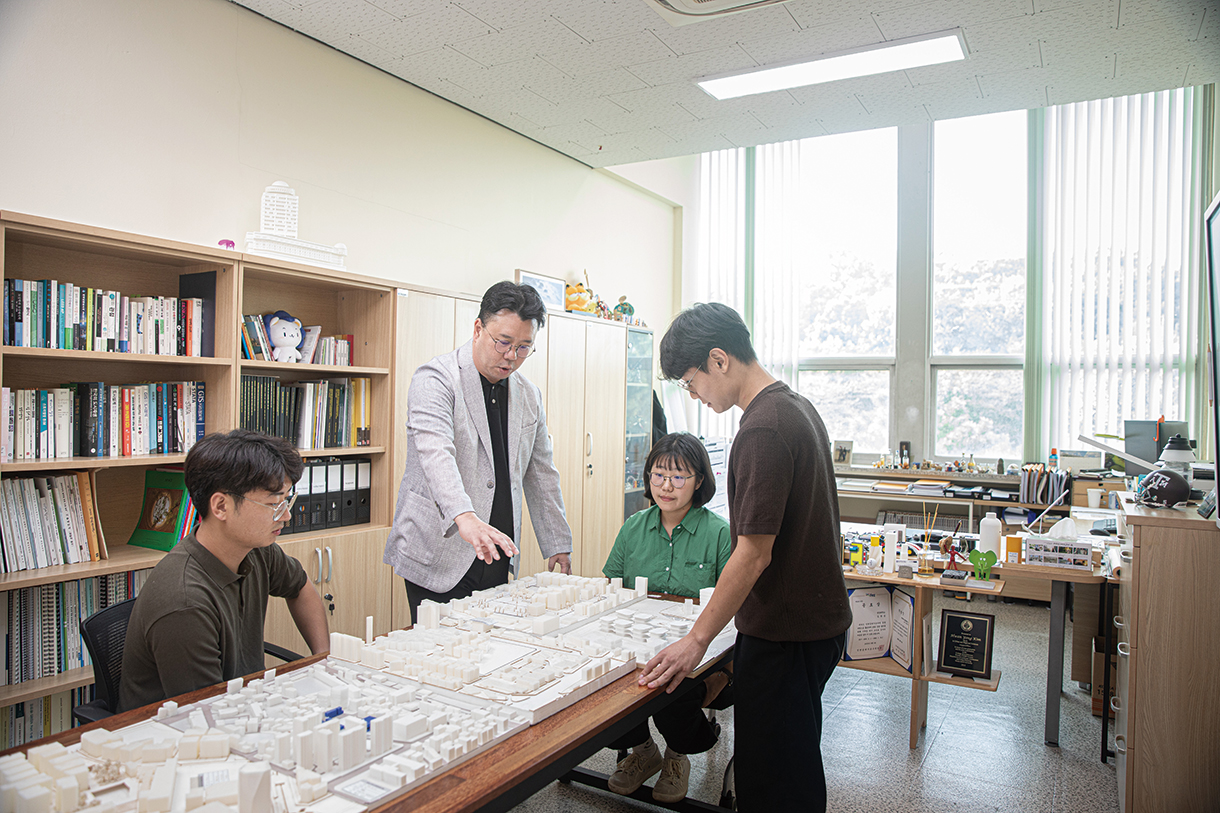
결과보다 중요한 것은 도시를 발전시키는 과정
현재 국내외에서 스마트도시 구현을 위한 다양한 활동이 이뤄지고 있다. 서울시는 시 차원에서 디지털트윈 환경을 구축했다. 신호등, CCTV 등을 통합 관리하는 교통정보시스템(TOPIS)으로 시민에게 원활한 정보를 제공하기 위한 인프라다. 대구시는 국내 최초로 도시데이터를 통합 관리하는 데이터 허브센터를 개소하고 교통ㆍ안전ㆍ시설 분야의 데이터를 수집, 관리, 분석하는 네트워크를 구축했다. 대구시의 데이터 허브센터 시스템은 UN의 국제표준을 받으며 크게 주목받았다.
영국의 런던은 데이터스토어를 통해 도시계획의 정보와 데이터를 공개하고 있다. 초기에는 정책 입안자들이 도시 문제 해결을 위해 활용하는 수단으로 쓰였으나, 이후 도시 인프라와 연결돼 런던의 실시간 정보를 제공하는 종합 플랫폼으로 자리 잡았다. 네덜란드 암스테르담의 경우 탄소배출을 줄이기 위한 ‘City-Zen 프로젝트’의 일환으로 스마트 그리드를 구축했다. 도시의 태양광 발전과 가정에서 생산한 전기를 저장 및 판매하는 네트워크를 구성한 것이다.
“세계적으로 스마트도시와 관련한 움직임이 활발합니다. 흥미로운 것은 스마트도시를 바라보는 선진국과 개발도상국 간의 해석에 차이가 크다는 것입니다. 개발도상국은 기술적 솔루션 등 결과와 성과에 집중하는 면이 큽니다. 반면 선진국은 스마트도시를 도시의 지속가능성을 담보하기 위한 여러 실천전략 중 하나로 봅니다. 그러다 보니 선진국형 스마트도시는 시민과 데이터 중심의 민주적 의사결정 과정 진보에 초점이 맞춰져 있습니다.”
김환용 교수는 스마트도시를 하나의 결과물로 보는 관점은 지양해야 한다고 강조했다. 우리에게 중요한 것은 도시를 만들고 발전시키는 과정에서 이뤄지는 무수한 의사결정과 참여자들의 노력, 그리고 혁신적인 사고다.
What matters more than the result is the process of developing a city
Currently, various activities to realize smart cities are being carried out in Korea and abroad. Seoul has established a "digital twins" environment at the city level. This is infrastructure to provide seamless information to people through a traffic information system (TOPIS) that integrates and manages traffic signals, CCTV, etc. The city of Daegu opened a data hub center that integrates and manages urban data for the first time in Korea, and established a network that collects, manages, and analyzes data in the areas of traffic, safety, and facilities. The data hub center system of Daegu received great attention by acquiring the UN’s international standard certification.
London, UK, opened to the public the information and data for urban planning through Datastore. Initially, it was used as a tool for policymakers to solve urban problems, but it has become a comprehensive platform that provides real-time information of London by being connected to the city’s infrastructure. Amsterdam, the Netherlands, built a smart grid as part of its “City-Zen Project” to reduce carbon emissions. This is a network that stores and sells electricity generated from the city’s solar power plants and homes.
“Movements related to smart cities are active around the world. What is interesting is that there is a big difference in the interpretation of smart cities between developed and developing countries. Developing countries tend to focus on results and achievements, such as technological solutions. On the other hand, developed countries view smart cities as one of many strategies to secure urban sustainability. As a result, smart cities in developed countries focus on citizens and democratic decision-making processes based on data.”
Professor Kim emphasized that we should avoid regarding smart cities as a single outcome. What are important to us are the countless decisions made in the progress of building and developing a city, the efforts of participants, and innovative thinking.
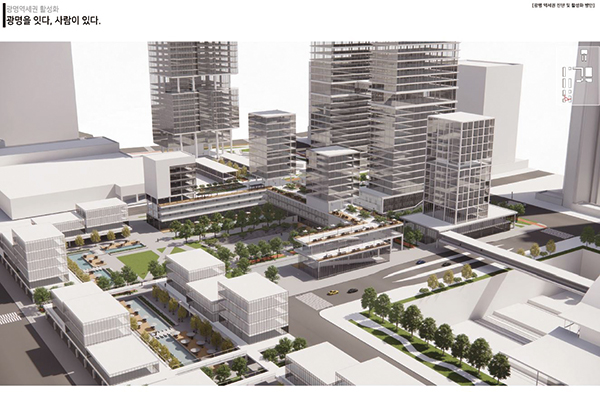
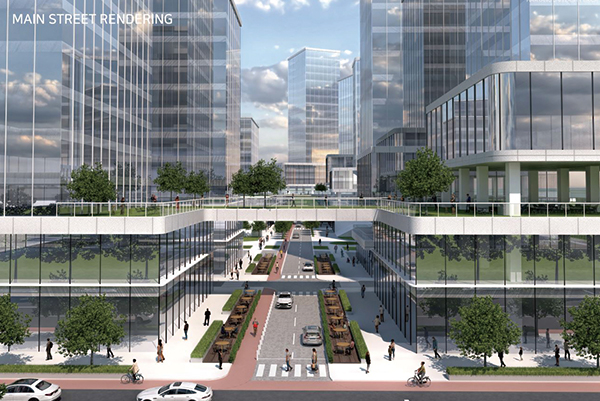
스마트도시 구축은 보다 지속가능하고 환경친화적인 거주환경을 만들기 위한 노력의 일환이다. 사용자 중심의 서비스와 기술을 제공한다는 데 중요성이 있다
Building smart cities is part of an effort to create a more sustainable and eco-friendly living environment. Their importance lies in providing more convenient services and technology for users.
한국형 스마트도시가 세계로?
최근 한양대와 경기도 광명시는 스마트도시 구현을 위해 긴밀한 협력에 나섰다. ERICA캠퍼스와 광명시가 빅데이터를 기반으로 한 스마트도시 조성을 위해 ‘교통ㆍ물류 분야 정보교류’ 업무협약을 맺었다. 서울캠퍼스는 ‘스마트도시-스마트건설 실현전략 시ㆍ산ㆍ학 세미나’를 개최하며 스마트도시의 핵심 기지로 거듭나려는 광명시의 미래에 대해 논의했다. 광명시는 현재 광명ㆍ시흥 3기 신도시, 광명ㆍ시흥테크노밸리, 하안2공공택지지구 등 향후 20년간의 대규모 건설공사를 앞두고 있다.
“한양대와 광명시가 협력을 위한 첫발을 내딛고 미래 비전을 세우고자 머리를 맞댔습니다. 향후 시와 학교가 공동으로 추진할 수 있는 중앙정부사업, 교육협력, 인력양성, 시ㆍ산ㆍ학 얼라이언스 구축 등 무궁무진한 기회가 있을 것으로 판단됩니다. 지자체와 학교 간 협력이 중요한 것은 어제오늘 일이 아니지만, 미래 산업으로 꼽히는 스마트도시 분야에서 한양대가 지자체를 선도한다는 것은 매우 기쁜 일입니다. 지역에 맞는 스마트도시가 제대로 구상되고, 구현되기 위해서는 시ㆍ산ㆍ학 연계가 더욱 강화돼야 합니다.”
김환용 교수는 안산시 대부동 마스터플랜, 광명역세권 종합발전계획, 고양시 영상문화단지 총괄계획 등 여러 지자체와 연구 및 실무를 진행하고 있다. 올해 1학기에 개설된 건축학전공 건축설계5 교과목은 광명시와 협업하는 IC-PBL로 운영했다. 11명의 학생과 ‘광명역세권 활성화 마스터플랜’이라는 주제로 한 학기 동안 학습한 것이다. 광명역세권을 기존 차량 중심에서 사람 중심의 친환경 공간으로 조성하기 위한 도시설계적 방안을 고심하고, 그 성과물을 두 개의 포트폴리오로 만들어 광명시에 전달했다. 해당 내용은 실제 광명역세권 종합발전계획에 일부분 반영됐다.
전 세계가 스마트도시에 관심을 기울이는 가운데, 국제 협력의 일환으로 국토교통부에서 추진하는 ‘K-City 네트워크 사업’도 본격화하고 있다. 우크라이나, 인도네시아, 이집트 등 해외 8개 도시에 한국형 스마트도시가 진출하게 된 것이다. 정부에서는 이번 기회를 바탕으로 한국형 스마트도시 수출에 힘 쏟을 계획이다. 한국형 스마트도시는 정부 간(G2G) 협력을 기반으로 계획수립부터 투자결정 단계까지 체계적으로 지원하며, 신도시 구축을 통해 에너지 신사업, 스마트 교통, 친환경 물산업, ICT 솔루션 등 다양한 분야에서 경쟁력 있는 기술을 맞춤형으로 제공한다.
“우리나라는 신도시 구축 경험이 매우 풍부한 국가입니다. 1, 2, 3기 신도시로 명명되는 신도시 건설은 전 세계에서도 유례없는 특별한 케이스죠. 우리가 보유한 다양한 기술은 세계 경쟁력을 갖췄습니다. 신도시, 신규택지개발, 재정비 사업 등 여러 도시적 사업을 진행해온 우리의 도시모델은 개발도상국의 사회ㆍ경제적 상황에 적합하고, 부가가치 창출에도 용이합니다.”
우리가 앞으로 경험할 도시는 기존과 비교할 수 없을 만큼 빠르고 혁신적으로 변화할 것이다. 그리고 그 중심에는 스마트도시가 있다. 김환용 교수는 열린 시각, 공동체적 사고방식으로 스마트도시를 이해해야 우리가 꿈꾸는 미래 도시를 만들어갈 수 있다고 말했다.
“미래 세대가 지속가능하고 쾌적한 환경에서 살아갈 수 있도록, 좋은 도시를 만들고자 하는 노력으로 스마트도시를 구현해야 합니다. 한양대가 쌓아온 교육ㆍ연구 인프라와 우수한 역량을 지닌 구성원들의 열정이 대한민국을 진정한 스마트도시의 중심지로 만들길 바랍니다.”
Korean-style smart cities around the world
Recently, Hanyang University and Gwangmyeong City, Gyeonggi-do, have begun close collaboration to implement a smart city. ERICA Campus and Gwangmyeong-si signed a business agreement on “information exchange in the field of transportation and logistics” to create a smart city based on big data. Seoul Campus held a “City-Industry-Academia Seminar for Smart City & Smart Construction Strategy” and discussed the future of Gwangmyeong-si, which is to become a core base for smart cities. Gwangmyeongsi currently has large-scale construction projects in the pipeline for the next 20 years, including Gwangmyeong-Siheung 3rd New Town, Gwangmyeong-Siheung Techno Valley, and Haan 2 Public Housing District.
“Hanyang University and Gwangmyeong-si took the first steps forward and put their heads together for future visions. It is believed that there will be infinite opportunities that the city and the university can jointly pursue, such as central government projects, educational cooperation, manpower training, and establishment of city-industry-academia alliances. It is nothing new that cooperation between local governments and academia is important, but it is a good thing that Hanyang University is leading cooperation with a local government in the future industry of smart cities. In order for a smart city to be properly designed and implemented for the region, the connections between the city, industry, and academia need to be further reinforced.”
Professor Hwanyong Kim is carrying out various research and work with several local governments, including the master plan for Daebu-dong, Ansan-si, the comprehensive development plan for the Gwangmyeong Station area, and the comprehensive planning for Goyang Visual Culture Complex. The Architectural Design 5 course for architecture majors, which was launched in the first semester of this year, was operated through IC-PBL in collaboration with Gwangmyeong-si. Eleven students studied for one semester on the topic of “Master Plan for Revitalization of the Gwangmyeong Station Area.” They considered and discussed urban design measures to transform the Gwangmyeong Station area from the existing vehicle-centered area to a people-centered area, and delivered the results to Gwangmyeong-si in two portfolios.
The contents were partly reflected in the actual comprehensive development plan of the Gwangmyeong Station area.
While the world is paying increasing attention to smart cities, we are also carrying out the “K-City Network” project promoted by the Ministry of Land, Infrastructure and Transport, as part of our international cooperation efforts. Korean-style smart cities have been applied in eight overseas locations in Ukraine, Indonesia, Azerbaijan and Egypt. The government plans to use this opportunity to focus on exporting Korean-style smart cities, which will be systematically supported from the planning to investment decision stages, based on Government-to-Government (G2G) cooperation. Through the construction of new towns, competitive technologies in various fields, including new energy businesses, smart transportation, eco-friendly water industry, and ICT solutions, will be provided.
“Korea is very experienced in building new cities. The construction of 1st, 2nd, and 3rd new towns is a case unique to Korea. Various technologies that Korea possesses are globally competitive. Korea’s city model, developed through many urban projects such as new towns, new housing development, reconstruction projects, etc., is suited for social and economic conditions of developing countries, and easily creates added value.”
The cities we are to experience in the future will change faster and more innovatively than before. At the center of such change are the smart cities. Professor Hwanyong Kim believes that we need to understand smart cities with an open mind and a community mentality to create the future cities that we dream of.
“We must implement smart cities with efforts to make good cities for the future generation to live in a sustainable and pleasant environment. I hope that the research and educational infrastructure that Hanyang University has accumulated and the passion of its competent members will make Korea the center of truly smart cities.”
